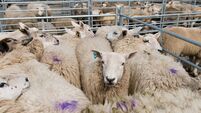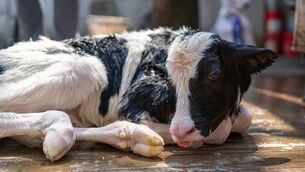This is no country for young farmers: 6% are under 35
Too few young recruits are entering EU farming, and older farmers are delaying their retirement.
Relatively low wages in farming compared to other occupations, and the attractions of urban life, turned the younger generation against it as a career — although such attitudes have been changed by recession in Ireland.
Meanwhile, farmers, like everyone else, are living longer, and with fewer exit opportunities for older farmers than for other occupations, the transfer to the next generation is taking longer.
Young farmers are faced with significant entry barriers, such as access to land and credit.
In the EU’s subsidised farm sector, the price of land is relatively high, to buy or rent, for a new entrant.
Farm-equipment companies, agri-chemical companies, and other suppliers, drive up prices because they know their customers are getting handouts from the EU. Buyers of farm produce ensure the average farmer gets just enough to survive, with the help of subsidies.
Young dairy farmers have to buy or rent expensive milk quota, and unless new entrants can buy subsidy entitlements, they have to make a living without any of the subsidies their neighbours earn.
This situation has been developing for generations, and is one of the worst-affected by the EU’s glacial pace of decision-making — and by what now looks like an unwillingness among member states to encourage the young to become farmers.
That is the inescapable conclusion of member states’ reactions to the European Commission’s bid, in its CAP reform proposals, to help young farmers get established.
The proposals were a breakthrough because they would make establishing young farmers mandatory for member states.
Previously, installation aid for young farmers was a voluntary measure for member states.
It had a low take-up rate in member states — which summed up their couldn’t-care-less attitude to young farmers.
It was in place in Ireland from 2001 to 2008, and helped about 4,300 to set up, before national budgetary difficulties forced its suspension in 2008, along with the Farm Retirement Scheme, which also greatly boosted farm transfer to the next generation.
This time around, the European Commission has also proposed to allocate up to 2% of direct payments to young farmers, for up to 25 hectares, for five years.
However, it became clear this year that a majority of member states wanted only a voluntary scheme, leaving them to decide whether or not to operate it — and leaving young farmers just another likely victim of austerity measures, without a fair chance to get established and earn the proposed 2% of direct payments (which could still get the axe in the CAP talks).
With many EU governments seeking to cut billions off the EU aid on which farmers depend, the future looks particularly bleak for young farmers.
Member states are condemning young farmers to life as farm labourers, or to emigration.
Unfortunately, they have to go to the other side of the world for their best opportunities, where well-educated young Europeans are welcomed as farm managers or farming partners, in New Zealand and Australia, and where agriculture is doing well, thanks to an enlightened policy on new blood.










